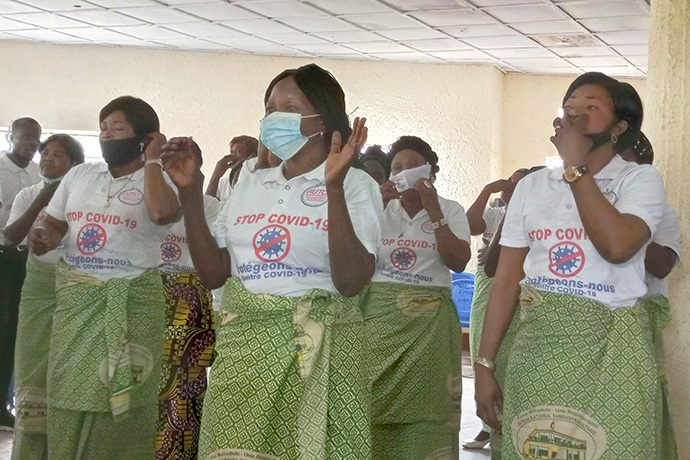
Key Points:
- Five hundred clergy and laity from isolated areas in Democratic Republic of Congo gathered to share stories and gain information.
- North Katanga Area Bishop Mande Muyombo encouraged participants to wear masks, use hand sanitizer and respect social distancing.
- In rural settings, it can be difficult to know whether a person has COVID-19 because of lack of tests and vaccines.
Almost 500 North Katanga Conference clergy and lay members met to discuss the impact of the COVID-19 pandemic on ministry and to address misinformation in rural areas.
“COVID-19 in Haut-Lomami province is real,” said Dr. Gary Pascal, a medical doctor at Kamina General Hospital. “The church initiative of bringing together both clergy and laity from the rural setting to learn about preventive measures is a saving process.”
During the Feb. 2-4 gathering, he shared how at provincial, national and international levels and in academia, experts work hard to reduce the spread of COVID-19.
North Katanga Area Bishop Mande Muyombo encouraged participants to wear masks, use hand sanitizer and respect social distancing. “The role of the church,” he said, “is prayer, outreach, social transformation and impactful advocacy.”
Muyombo said he would advance training on COVID-19 and help people learn to cope with it.
The pandemic forced both clergy and laity to achieve a delicate work balance. A family worship program was organized, strengthening relationships during lockdowns. Home visits were restricted. Instead of collecting offerings during in-person worship, families sent financial gifts in envelopes. The only way to check on church members was by telephone calls.
Participants listened to the experiences of COVID-19 survivors, including Dr. Kitobo Joseph, who heads the program on leprosy and tuberculosis in the province. When he contracted COVID-19, he recognized the lack of equipment and tests.
“This pandemic is a reality,” he said. “I survived, thanks to the medical team of the general hospital who gave me special attention and intensive care and administered appropriate drugs. That is why you see me strong.”
Dr. Katongola Kayembe Joseph said in rural settings, it is difficult to know whether a person has COVID-19 because of lack of tests and vaccines.
“A lot of patients, when having fever, headache or cough, deal with inhalation of herbs.”
He urged leaders to set an example by wearing masks at all times and respecting social distancing.
To avoid large crowds at gatherings, local churches increased the number of worship services — two per day in villages and three in town, according to the Rev. Walassa Bub.
“I know the state of village health centers,” he said. “The only way to reduce the spread is to observe social distancing and sanitary measures.”
Muyombo encouraged leaders to use reason to prevent COVID-19, save lives and reflect on the slogan: “This is how we live routinely.”
Dr. Katongola Kayembe Joseph said he hoped the training would lead to change.
“This training has to bring a shift,” he said, noting that nurses at Kabongo hospital are being exposed, as are pastors and teachers. “A joint effort to prevent COVID-19 is most needed in various villages in North Katanga,” he said.
Pascal saluted the United Methodist initiative of inviting church leaders and traditional healers to trust the medical team to advise on preventing COVID-19.
“Social media (sites) have spoiled a lot of people in villages in terms of misinformation about vaccines,” said Dr. Michael Mwema Kyungu. “We will all be in security when we are vaccinated. This appeal is to dismiss the misinformation from social media about the vaccine.”
Dr. Nelly Ngoy Kabila also shared her experience of surviving COVID-19. She insists on preventive measures and community security.
On the last day of the training, participants were reminded that The United Methodist Church has commissioned them to share correct information in the community via local radio and guest speakers.
The Rev. Mulamba Mpanga, University of Kabongo, said he is committed to sharing accurate information. “Traditional healers should work in collaboration with medical teams to save lives in the community,” he said. “A lot of people use herbs to heal themselves, but lack of dosage is another challenge in the community. In the community where I serve, people do not go to a health center. They are used to self-medication.”
The Rev. Bukasa Tshimanga Jean Claude serves an independent church. He expressed thanks to The United Methodist Church for inviting him to attend the COVID-19 training. “I will uplift cultural values of sharing information in a story,” he said, “so that all understand how to prevent COVID-19 in my local congregation.”
Referring to the bishop’s presentation on the Wesleyan theology of reason, he added, “There is need to add reason to our spirituality, tradition and experience.”
Musau is the director of communication in the North Katanga Conference.
News media contact: Julie Dwyer at newsdesk@umnews.org. To read more United Methodist news, subscribe to the free Daily or Weekly Digests.



